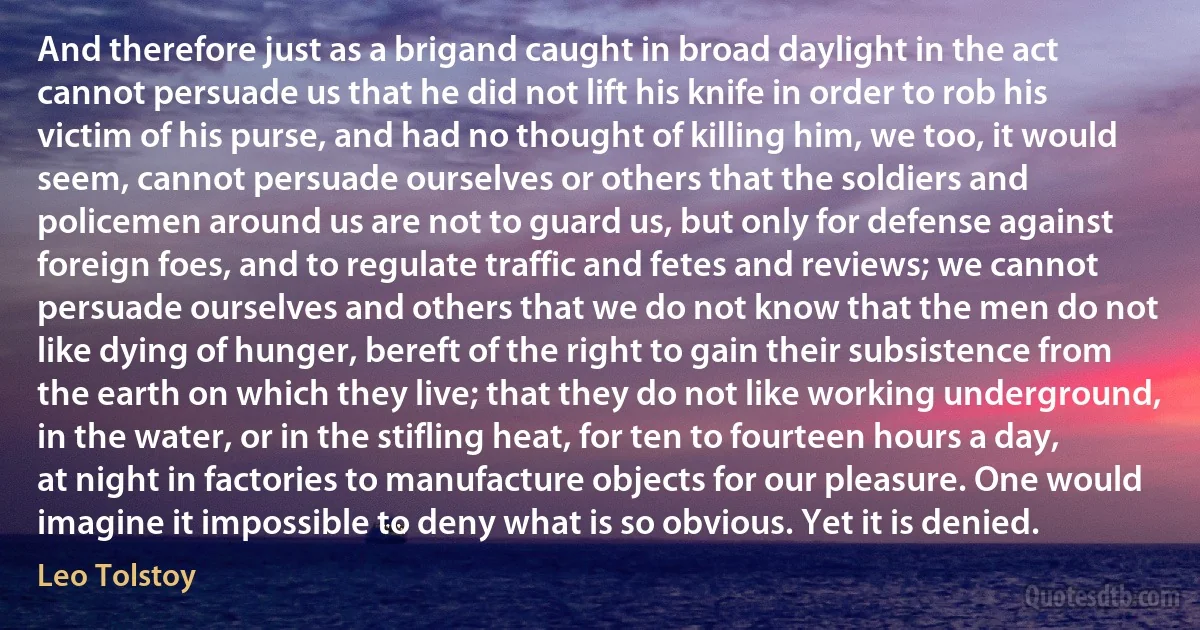
And therefore just as a brigand caught in broad daylight in the act cannot persuade us that he did not lift his knife in order to rob his victim of his purse, and had no thought of killing him, we too, it would seem, cannot persuade ourselves or others that the soldiers and policemen around us are not to guard us, but only for defense against foreign foes, and to regulate traffic and fetes and reviews; we cannot persuade ourselves and others that we do not know that the men do not like dying of hunger, bereft of the right to gain their subsistence from the earth on which they live; that they do not like working underground, in the water, or in the stifling heat, for ten to fourteen hours a day, at night in factories to manufacture objects for our pleasure. One would imagine it impossible to deny what is so obvious. Yet it is denied.
Leo TolstoyRelated topics
act catch day daylight dying earth foreign gain guard heat hours hunger impossible men killing knife lift live manufacture night order pleasure purse right rob stifling subsistence ten thought traffic water working yet othersRelated quotes
Strictly speaking, the word hypnotism should be reserved only for those patients who actually fall into a state of sleep, and who forget upon awakening all that occurred during this state. When this is lacking, it is a question merely of reverie or dreaming. It would therefore be apposite to establish a terminology, characterising these modifications which result from the hypnotic process; indeed, with regard to those conditions resistant to ordinary medication and suitable for cure by hypnotism, hardly one patient in ten arrives at the unconscious stage of sleep (at least for the whole duration of the process). The word "hypnotism” can then lead them into error and make them believe that they do not benefit in any way from a process of which the characteristic and obvious effects do not appear to be those that the name [i. e., "hypnotic sleep"] indicates.

James Braid
Don't forget that God sees you and watches you when you are in pain; He perceives even the beating of your heart. Consequently, He will not leave you without consolation and His fatherly protection. Naturally, the saints rejoiced in their afflictions; as for us, let us at least manage to accept affliction or pain patiently.
My child, pray within your heart, and the name of Jesus will become for you a comforting balm so that you can bear this trial of yours in a way which benefits you. You will greatly benefit from this trial if you submit yourself to it patiently. So again I say to you, with the almighty armor of prayer continually approach the omnipotent Lord more often, and you will come to know how He wondrously lifts the burden of pain and marvellously gives rest to sufferers.

Ephraim of Arizona
WHAT HAPPENS AFTER DEATH?
When a human soul goes out of the body, some great mystery happens. For if it is guilty of sins, then there come hordes of demons, evil angels and dark forces, take that soul and drag it to their side.
No one should be surprised at that, because if a man surrendered and fell prey to them while still alive in this world, will not they have even greater control over him and enslave him when he departs from this world?
As for the other, the better part of people, something different happens to them. There are Angels around the holy servants of God in this life; the holy spirits surround them and protect them; and when their souls are separated from the body, the choir of Angels welcomes them into their fellowship, into a bright life, and thus leads them to the Lord.

Macarius of Egypt
Just at the time I got your letter Mr. Angus sent me the 'Scotsman' [magazine]. You say some critics have thought it fair to make it the basis of a personal attack, and it is very critic-like. Critic means knife, means dissection, means wisdom, means perfection. Art is stupid, art-less. That is a hard job for the critic to understand. I like your book because it is 'stupid', like Japanese; which means done for the love of it in itself; not for gain or success. You don't go to criticise a Japanese drawing and say it is out of shape, out of drawing, no perspective nor anatomy. This is only for the critic to show his knowledge by killing the things; those stupid fellows do harm, like Whistler says, with their learnings. They must have schools and applications of knowledge. Thackeray calls them scavengers - scavengers are at least necessary, those fellows are for no good..

Matthijs Maris
In Mussolini's Italy of the nineteen-thirties, when it meant long terms of improsonment, and perhaps torture or even death, to be in any way connected with the Communist Party, and when not only all the works of Marx, Engels, Lenin and Stalin, but the works of all Italian and foreign democrats and progressive were strictly banned from Italian libraries and bookshops, the works of Trotsky, on the "new kind of communism" were "freely" and widely translated and distributed. I remember vividly how in 1938, passing through Italy on the way to meet the anti-fascist and Communist students of Belgrade University, and spending a few hours in Mussolini's Milan, the word "communism" caught my eye on a number of books prominently displayed in a bookshop window. They were the newly translated works of Trotsky.

James Klugmann
